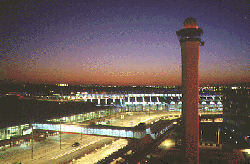Assignment Could Last Years, as Autonomous Federal Agency Can't
Do Its Job
 It's about as bad as the cynics had predicted: the
new Transportation Safety Administration, born in haste as a
knee-jerk reaction to September 11, can't get the job done in time;
and it's going to cost taxpayers even more than the feds had hoped
to spend.
It's about as bad as the cynics had predicted: the
new Transportation Safety Administration, born in haste as a
knee-jerk reaction to September 11, can't get the job done in time;
and it's going to cost taxpayers even more than the feds had hoped
to spend.
As we have repeatedly noted, there were, and are, serious problems
in the airport security systems. As no one else seems to have
noticed, though, none of September 11's terror was related to any
such problems. On September 11, all procedures were followed: box
cutters were allowed on commercial airline flights; flight crews
were told to cooperate with hijackers; as far as anyone knows, no
cockpit doors were forced open. September 11 was the cumulative
result of what now looks like monumentally bad judgment by the
security experts, rather than any failure of execution by those
assigned to carry out the plans. When terrorists planned their
despicable acts, they simply followed the rules.
Now, security experts have determined that changing the
poorly-trained "low-level munchkins" at the airports will make a
difference, and they first inserted thousands of untrained (in that
task) National Guard personnel. When the governors' patience wore
thin and prompted President Bush to admit that private-sector
security was more of a police than a military function (and order
the National Guard out by the end of this month), the special
police of the TSA were supposed to take over training the security
people. Through monumental bureaucratic maneuverings, that agency
has now managed to staff one airport -- Baltimore-Washington
International (BWI) -- and, even there, the agency admits that
"its" screeners (who reportedly can make upwards of $70,000 a year)
were made up of those very folks they were called in to replace.
John Magaw, capo of the TSA, while not actually answering
reporters' questions, did admit that "over half" of the screeners
he's now paying, were previous airport screeners. (What proportion
"over half," he wouldn't say.)
To Chicago
 Since the Illinois National Guard will go back to
soldiering, and leave O'Hare and Midway behind this Friday, Magaw's
guys were supposed to provide security for that city's travelers.
That's not going to happen, though: the Chicago Tribune reports
that, "...off-duty Chicago police officers will take over the
security details at Chicago's airports." Since the TSA isn't
expected to get its job done any time soon, the Jon Hilkevitch and
Rogers Worthington story warns that, although the TSA spokesman
said the use of Chicago's cops was "temporary," "although he
acknowledged it could go on for about 1½ years because of
the many challenges facing the agency. And many details remain
unsettled, including how much the federal government will reimburse
the city for taking over the responsibilities."
Since the Illinois National Guard will go back to
soldiering, and leave O'Hare and Midway behind this Friday, Magaw's
guys were supposed to provide security for that city's travelers.
That's not going to happen, though: the Chicago Tribune reports
that, "...off-duty Chicago police officers will take over the
security details at Chicago's airports." Since the TSA isn't
expected to get its job done any time soon, the Jon Hilkevitch and
Rogers Worthington story warns that, although the TSA spokesman
said the use of Chicago's cops was "temporary," "although he
acknowledged it could go on for about 1½ years because of
the many challenges facing the agency. And many details remain
unsettled, including how much the federal government will reimburse
the city for taking over the responsibilities."
The TSA has taken care of its highly-paid bureaucrats, though: it
has demanded 20,000 square feet of office space at O'Hare and
Midway; but it's unsure just what rent it will dictate that it will
pay.
Cities to take up the burden
When we checked on similar TSA arrangements, we were told that
the TSA would reimburse the city for direct expenses (e.g.,
hours, overtime) but the TSA couldn't say whether all expenses
(prorated benefits, taxes, for example) would be reimbursed; and we
were also told that "infrastructure" -- wear and tear on police
cars, uniforms, additional staffing required to cover for
anticipated additional sick and vacation time, etc. -- would be the
local department's problem.
Massive transfer of wealth
The entire program of "federalization" does more than just cost
more money for airport, and airline security. It transfers the
costs of such security from those who directly benefit (the
airlines and their customers) to those who receive little or no
benefit from it (such as non-fliers in Montana, for instance).
Since the airlines are private entities, their responsibility to
provide security should be their expense. If security for the
airlines should be the taxpayers' responsibility (regardless
whether they fly or not), then why limit federal involvement to
just airlines? Wouldn't all transportation industries, all mining,
all power generation, all water supply, all banks, and all public
beaches, say, be equally deserving of such "protection?"
Fliers pay, too
 It's not as though the fliers aren't paying more,
also. The "leg tax," currently $2.50 per (with a $10 maximum, per
ticket) is currently being reconsidered in Congress; they're
talking about voting on doubling that, possibly as soon as this
week. The money, which, at the doubled rate, would amount to over
$4 billion, would go to the TSA, which says it needs the money,
NOW, to buy all those explosive-detection machines. [It is unlikely
that, after those machines are purchased, the TSA will lobby to
have the "leg tax" rescinded --ed.]
It's not as though the fliers aren't paying more,
also. The "leg tax," currently $2.50 per (with a $10 maximum, per
ticket) is currently being reconsidered in Congress; they're
talking about voting on doubling that, possibly as soon as this
week. The money, which, at the doubled rate, would amount to over
$4 billion, would go to the TSA, which says it needs the money,
NOW, to buy all those explosive-detection machines. [It is unlikely
that, after those machines are purchased, the TSA will lobby to
have the "leg tax" rescinded --ed.]
Flying's like smoking, to congress. (It's a way to get more
money to spend.)
Continental Airlines quickly pointed out that this would bring
the total taxes on a $100 ticket to a record $53 at a time when
economic conditions are weak and airlines are struggling to
eliminate catastrophic losses.
"Having the effect of a consumption tax, the higher fees will
further diminish the current lackluster demand for airline travel,"
said Continental Chairman and CEO Gordon Bethune. "Legislators have
justified taxes on cigarettes and alcohol of up to 18 percent
because they are trying to discourage their use. Unfortunately,
imposing taxes as high as 53 percent on airline tickets will have
the same effect as the sin taxes, thereby threatening the
livelihoods of the millions of people working in this
industry."
Additional Police Required
Even when the TSA finally gets on with its job, law enforcement
will still be assigned to airport security. This is part of their
regular duty: one cop, at least, is required for each screening
position (if there are more than six lanes at a single point, an
additional cop is added for every seventh one). That is a "normal"
staffing level, and is not what's at issue here.
 What's going on now, is that, as the TSA takes
over airport security (and recycles essentially the same people
into federal benefits, pay scales, and immunity from civil
litigation), additional burdens are being put on the local
taxpayers -- even as the number of travelers (those who directly
benefit) remains well below year-ago levels. Is security any better
than it was before September 11? It's hard to say: September 11 was
a unique experience: nothing like it had ever happened before,
either -- even with all the low-cost, poorly-trained,
privately-employed workers' following what now look like stupid
training protocols. The question is, today: which of the new
protocols will look stupid, and which of the millions of dollars'
wasted, when the next attack occurs -- and will it involve
airlines?
What's going on now, is that, as the TSA takes
over airport security (and recycles essentially the same people
into federal benefits, pay scales, and immunity from civil
litigation), additional burdens are being put on the local
taxpayers -- even as the number of travelers (those who directly
benefit) remains well below year-ago levels. Is security any better
than it was before September 11? It's hard to say: September 11 was
a unique experience: nothing like it had ever happened before,
either -- even with all the low-cost, poorly-trained,
privately-employed workers' following what now look like stupid
training protocols. The question is, today: which of the new
protocols will look stupid, and which of the millions of dollars'
wasted, when the next attack occurs -- and will it involve
airlines?
As for Chicago's plight: the Tribune writers say that Police
spokesman Robert Cargie thinks the department is in for the long
haul. With the feds' already admitting they'll be nursing from the
Chicago PD for a year and a half, Cargie seems to thing that
timeframe would be good news. He thought of the assignment of his
officers differently: "I wouldn't call it temporary but open
ended."
 ANN's Daily Aero-Term (05.05.25): Circle To Runway (Runway Number)
ANN's Daily Aero-Term (05.05.25): Circle To Runway (Runway Number) ANN's Daily Aero-Linx (05.05.25)
ANN's Daily Aero-Linx (05.05.25) NTSB Prelim: De Havilland DHC-1
NTSB Prelim: De Havilland DHC-1 Classic Aero-TV: The Boeing Dreamliner -- Historic First Flight Coverage
Classic Aero-TV: The Boeing Dreamliner -- Historic First Flight Coverage Airborne-NextGen 05.06.25: AF Uncrewed Fighters, Drones v Planes, Joby Crew Test
Airborne-NextGen 05.06.25: AF Uncrewed Fighters, Drones v Planes, Joby Crew Test






